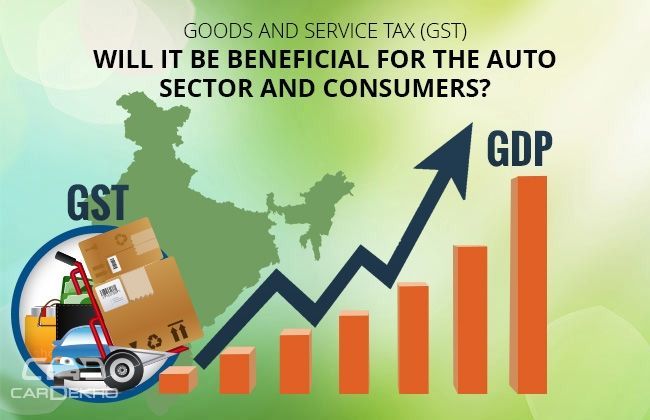The Goods and Sales Tax will be a hot topic of discussion during this year’s budget. It will be the biggest tax reform for the country and there is a lot of anticipation for the same amongst consumers, manufacturers as well as the state governments. The auto industry is one sector which may benefit heavily with the implementation of the GST; we summarize what is the GST and how will its implementation will affect the auto sector.

What is Goods and Service Tax (GST)?
The Goods and Service Tax is a single rate tax levied on the manufacture, sale and consumption of goods as well as services at a national level. In this system the GST is implemented only on the value added at every stage of production. This will ensure there is no cascading effect of taxes (tax on tax paid) on inputs that are used in manufacturing goods. Currently services are taxed at 10 percent and if the indirect taxes on goods are added, we pay around 20 percent tax on commodities. With the GST, the expected tax rate should be between 14-16 percent. The prices of goods are expected to fall, and in the long term we can expect the dealers to pass on these benefits to the end consumer as well.
How will the auto industry benefit from GST?
Manufacturing sector in India is one of the highly taxed sectors in the world. A complex and high taxation structure has the tendency to render products uncompetitive in the international market or consume large portions of the cost arbitrage available in manufacturing set-ups in low cost economies such as India. GST when enforced would eliminate complexities in the present taxation structure and consequently prevent the loss of nearly 50% of the advantage of lower manufacturing costs that India has over the western nations. A well-designed GST is the most graceful method to get rid of distortions of the existing process of multiple taxation.
Mr. Abdul Majeed, partner Price Waterhouse believes ‘There could be incentives to promote electric vehicles, as well as alternative fuel, primarily to increase consumer awareness and boost demand for such vehicles. Success of these is critical for energy security, as India currently imports 80 per cent of its crude oil needs. And, such vehicles also reduce carbondioxide emission. There have been demands for sops on vehicle replacement. If there is such an announcement, it will help boost demand, especially in the commercial vehicle space.’
Here is what some auto industry experts feel about the upcoming budget:
- The Society of Indian Automobile Manufacturers (SIAM) wants Finance Minister Arun Jaitley to reduce excise duty on automobiles in the upcoming Budget to help the sector combat a demand slowdown. SIAM deputy Director General Sugato Sen said: “We expect reduction of excise duties on automobiles, which is required considering market conditions and demand now; apart from the need to support the auto sector, excise duty must be lowered keeping in mind the roadmap for GST implementation.”
- Excise duty on small cars, scooters, motorcycles and commercial vehicles was reduced to 8 per cent from 12 per cent previously. For SUVs, it was cut to 24 per cent from 30 per cent; for mid-sized cars, to 20 per cent from 24 per cent and to 24 per cent for large cars from 27 per cent. For the consumer durables sector the excise duty was reduced to 10 per cent from 12 per cent.
- Auto industry body SIAM or Society of Indian Automobile Manufacturers president and Toyota Kirloskar vice-chairman Vikram Kirloskar believes the taxes on automobiles in India are quite high and need to be brought down in order to give a thrust to the industry, which has been battling slowdown. Mr. Kirloskar said “If Finance Minister Arun Jaitley does decide to cut excise duty on automobiles later this month in the Budget, auto sales could see a 7-8 per cent growth during the calendar year ending December 2015, he said.


